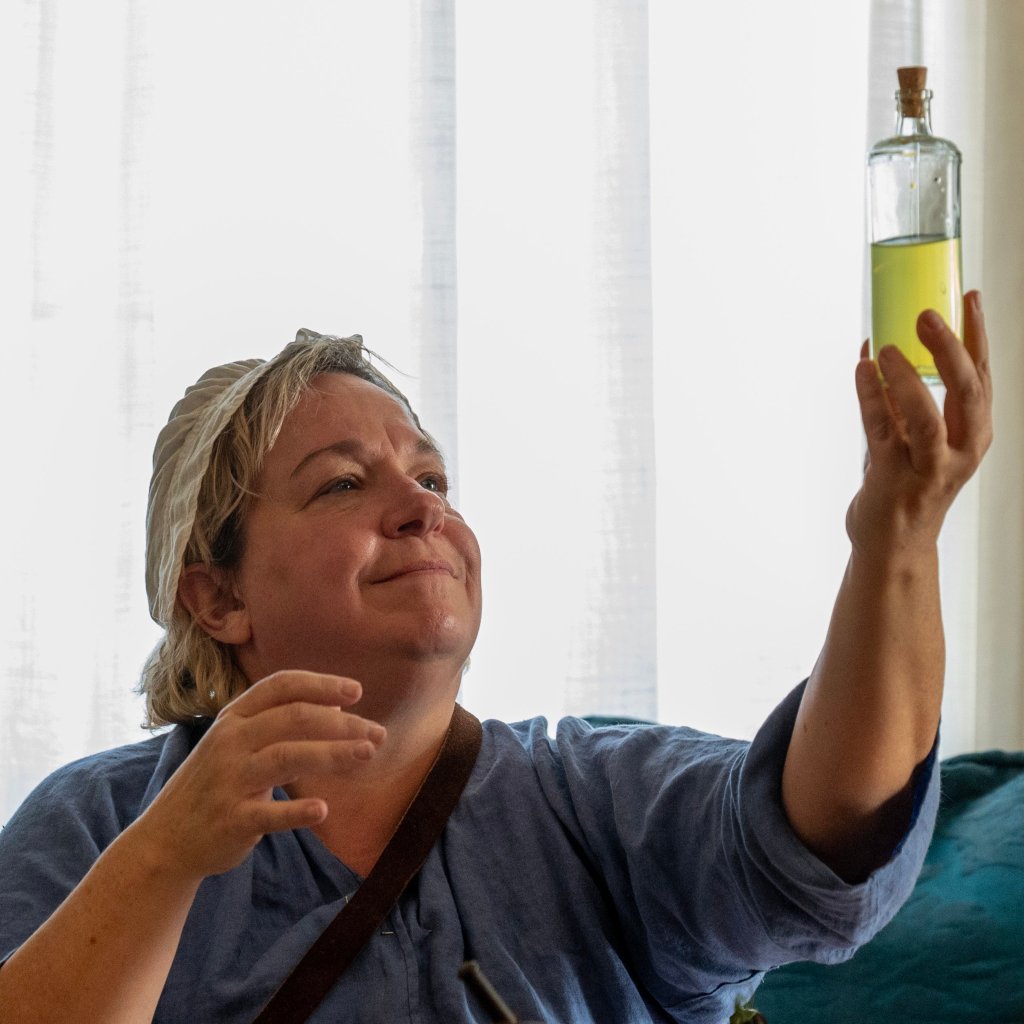AUGUSTA — Maine midwives and local officials gathered Thursday afternoon at the Blaine House to recognize one of the Augusta area’s most significant historical figures, Martha Ballard, whose diary, written between delivering 816 babies in the 1700s and 1800s, provides a rare, woman’s perspective of otherwise sparsely documented Colonial life.
Despite the more than 200 years since Ballard’s death, Maine could use a Martha Ballard in every community now, Linda Robinson told a gathering of about 50 Ballard fans at a Blaine House tea ceremony. Robinson is a nurse-midwife who uses Ballard’s diary in teaching midwifery to students at College of the Atlantic in Bar Harbor and internationally.

While recorded narration tells a story of Martha Ballard using herbs and urine to make treatments for diseases, actress Nancy German performs Thursday while holding a bottle during a “For The Love Of Martha Ballard” event at the Blaine House in Augusta. Joe Phelan/Kennebec Journal
“In rural communities all over this country, women’s’ health services are being eliminated,” Robinson said. “There were not enough midwives to care for the growing population of Maine in the early 1800s. And we have a similar story today.
“Our current practice makes vulnerable women do the traveling. Leaving their families and support systems, forcing them to do this on small roads, in winter storms and summer traffic. Wouldn’t it make more sense to have a Martha Ballard in every Maine community?”
The event came as local admirers of Ballard are raising funds to build a memorial to Ballard, whose diary was turned into the Pulitzer Prize-winning book “A Midwife’s Tale.” The memorial would be built a few hundred feet from where Ballard lived, next to the Kennebec River at Augusta’s Mill Park.
Ballard’s diary recorded the 816 births she attended, but also described what life was like in a time when most women could not read or write, and there is scant written history about life in what is now central Maine.
Her documentation of births, including the conditions of the baby and mother, was the first time anyone recorded vital statistics in this country, Robinson said.
Actress Nancy German portrayed Ballard at the event, acting out scenes from her busy, exhausting life tending to births and deaths in the area and providing other health care, while also tending to her household, running a business, overseeing a large family and gardening.
Wearing period clothing, German acted out scenes from Ballard’s times, including difficulties traveling primitive roads and crossing the treacherous Kennebec River. She said Ballard would testify at trials about who the fathers were of children who were then called illegitimate.
“Martha Ballard stood for justice,” German said, raising her fist into the air. “Stand with me, midwives! Stand with me!”
Singer-songwriter Charles “Skip” Wheeler wrote a ballad for Ballard, singing it Thursday while his son, Josh, played the keyboard. Part of the song was from the perspective, he said, of the 816 people she delivered, in a time when there were no hospitals.
“Martha, we’re all here to thank you — 816 thank-yous for giving us life,” Wheeler sang. “You gave of yourself, to give us that life. Through you, we live on, in our descendants living today. Though we’ve long since passed away, we still have a debt we wish to repay. In humble tribute, we hope is of worth, from our hearts and souls, to the angel of birth, to you, dear Martha, the angel of birth. The angel of birth, the midwife.”
Send questions/comments to the editors.








